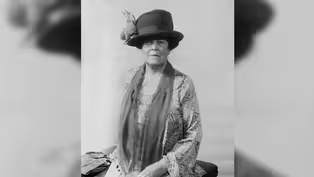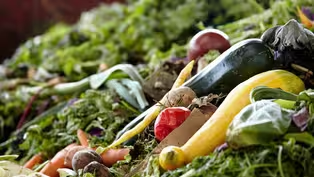
Tapping Trees
Clip: Season 4 Episode 13 | 5m 56sVideo has Closed Captions
Tom Buck has spent decades tapping trees in Rhode Island for maple syrup.
A long-time maple producer in Rhode Island eagerly awaits the sweet taste of spring every year. Tom Buck of Uncle Buck’s Sugar House says his work is directly tied with the weather. Buck shows Rhode Island PBS Weekly what it takes to turn maple sap into syrup and why he loves sharing his passion with children.
Problems playing video? | Closed Captioning Feedback
Problems playing video? | Closed Captioning Feedback
Rhode Island PBS Weekly is a local public television program presented by Ocean State Media

Tapping Trees
Clip: Season 4 Episode 13 | 5m 56sVideo has Closed Captions
A long-time maple producer in Rhode Island eagerly awaits the sweet taste of spring every year. Tom Buck of Uncle Buck’s Sugar House says his work is directly tied with the weather. Buck shows Rhode Island PBS Weekly what it takes to turn maple sap into syrup and why he loves sharing his passion with children.
Problems playing video? | Closed Captioning Feedback
How to Watch Rhode Island PBS Weekly
Rhode Island PBS Weekly is available to stream on pbs.org and the free PBS App, available on iPhone, Apple TV, Android TV, Android smartphones, Amazon Fire TV, Amazon Fire Tablet, Roku, Samsung Smart TV, and Vizio.
Providing Support for PBS.org
Learn Moreabout PBS online sponsorshipe days grow longer and the weather gets warmer, maple producers get busy tapping trees.
But what does it take to turn maple sap into maple syrup?
Michelle San Miguel recently met a sugar maker in Southern Rhode Island who gave us a closeup look.
- Any maple tree will give you sap.
I just love doing it.
I love meeting people.
I love talking to the kids.
I just have a good time doing it.
After 20 some years, I should I hope-- - [Pamela] Every year Tom Buck eagerly awaits the sweet taste of spring.
- So sap coming out of a maple tree is just like water.
You wouldn't know the difference.
- [Pamela] He closely monitors the weather.
- We need above freezing temperatures during the day and below.
Freezing temperatures at night.
- [Pamela] As late winter gives way to warmer days.
- You want to drill it at an angle.
Not like this, not straight.
Just a little downward angle.
- [Pamela] And Uncle Buck, as he's often called, loves sharing what he knows about maple syrup.
- Right about here, little bit of an angle.
- [Pamela] With students who visit his storefront in Southern Rhode Island.
- And we don't drive them in like a with a nail either.
There's more to life than this.
Every time I see kids, they're always on their cell phones and stuff like that.
And there's so much more to do and see out there than technology.
- [Pamela] Buck's interest in making maple syrup began in the 90s when a neighbor gave Buck a jar that he had made.
Buck was intrigued and soon he started to make his own.
- And then I would give it to the neighbors and they told me, "Hey, I got maple trees.
Wanna tap mine?"
I said, "All right, I'd do that."
So we bought more buckets, real maple syrup buckets, and we kept going and going and going.
I got on that maple train and it just hasn't stopped.
(wood stove door creaking loudly) - [Pamela] He opened Uncle Buck's Sugar House in Hopkinton in 1997.
But all these years later, he's still reminded mother nature is in charge.
Buck says the amount of sap he's collected this year is down because there have been so few nights with plummeting temperatures.
- When it gets below freezing at night, the sap comes out of the roots and goes up into the branches and during the day when it gets warm, it goes from the branches back down into the roots.
So we are catching it as it going up inside the tree, up and down.
But when we have two and three and four days that it doesn't go below freezing, sap doesn't run.
- [Pamela] He has more than 300 taps.
Most of them are in Westerly.
The sap flows through a system of plastic tubing.
All of the sap that comes out of these trees then goes into this collection tank.
- This year we're at 2% sugar content, so it's taking us about 53 to 60 gallons to make one gallon syrup.
- And you estimate that you'll produce how many gallons of syrup?
- The way the weather's been going this year, that would be a tough guess because this season has been... Where our volume is down a lot this year.
- [Pamela] Despite the uncertainty that comes with making maple syrup, Buck is grateful to do something he loves and on the very property that's been in his family for more than 80 years, starting with his grandparents.
- Grandpa taught me electrical wiring, carpentry.
That lawnmower right there, hanging up above the door, the push one, I used to mow this grass with that.
And then he bought a Wheel Horse tractor in '75, '76.
I still had to use that.
(chuckles) This is the amber rich here.
- [Pamela] Buck takes great pride in making maple syrup.
He sells three grades of it.
He also makes and sells maple leaf candies, maple kettle corn, and maple cream.
- And what do you put the cream on?
- Me personally?
Peanut butter sandwiches.
- You do?
- Yes.
It just has that flow together.
I just throw it in the microwave for a little bit and probably 15 seconds to soften it, spread it onto the other half of the bread.
- That sounds so good.
- Oh my God.
It's the die for.
- [Pamela] Eventually Buck plans to scale back and just make maple syrup for his family.
But he hopes his love for sugar making inspires others to be more self-reliant, a lesson he learned from his ancestors.
- I miss my grandparents and if they were alive when I started this, they'd be sitting out here right next to me doing it.
(gentle music) (gentle music continues)
Video has Closed Captions
Clip: S4 Ep13 | 8m 24s | Alva Vanderbilt Belmont, Newport’s Gilded Age socialite, evolves into ardent suffragette. (8m 24s)
Video has Closed Captions
Clip: S4 Ep13 | 13m 22s | One-third of all food in the U.S. goes uneaten. Weekly explores why. (13m 22s)
Providing Support for PBS.org
Learn Moreabout PBS online sponsorship
- News and Public Affairs

Top journalists deliver compelling original analysis of the hour's headlines.

- News and Public Affairs

FRONTLINE is investigative journalism that questions, explains and changes our world.












Support for PBS provided by:
Rhode Island PBS Weekly is a local public television program presented by Ocean State Media

